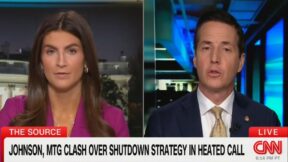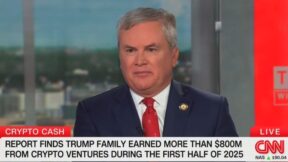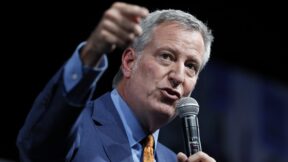Trump Boasts About His ‘War on the World’ Before Backtracking – But Adds, ‘It’s Our Turn’ to Rip Off Other Countries
President Donald Trump does not appear remotely close to changing course on his pledge to impose across-the-board tariffs on nearly all imports beginning on Wednesday. That includes a whopping 104% tariff on Chinese goods.
On Tuesday night, Trump gave the keynote address at the annual National Republican Congressional Committee in Washington, D.C. His remarks came hours after yet another down day for markets, which have plummeted since he announced sweeping tariffs on virtually all imports, with a baseline figure of 10%. Trump singled out dozens of countries for even higher tariffs, including China, which has vowed to “fight to the end.”
The president has justified the drastic moves by claiming his actions are “reciprocal.” However, the White House used a formula centered on the trade deficits the U.S. has with other countries to falsely allege that exorbitant tariffs had been placed on U.S. goods. The gimmick has been widely mocked, even by conservatives and Republican donors.
In his speech, Trump referred to his “war with the world” before reversing himself.
“And I do think that the war with the world, which is not a war at all because they’re all coming here,” Trump claimed. “They’re all coming here. Japan is coming here as we speak. They’re in a plane flying, lots of them, all tough negotiators.”
Trump then pivoted to China and bragged about the massive tariffs that are about to go into effect on the country. While doing so, Trump falsely stated that China will pay the tariff.
“Right now, China is paying a 104% tariff,” he said as the crowd applauded. “Think of it – 104%. Now, it sounds ridiculous, but they charged us for many items – 100%, 125%. Many countries have. They ripped us off left and right. But now it’s our turn to do the ripping. That’s ok. We’re gonna make our country even stronger, stronger than it ever was.”
The president has repeatedly claimed that exporters pay tariffs on goods they ship to the U.S. This is incorrect, as importing businesses pay the tariffs, which are usually passed on to consumers in the form of higher prices.
Watch above via C-SPAN.




